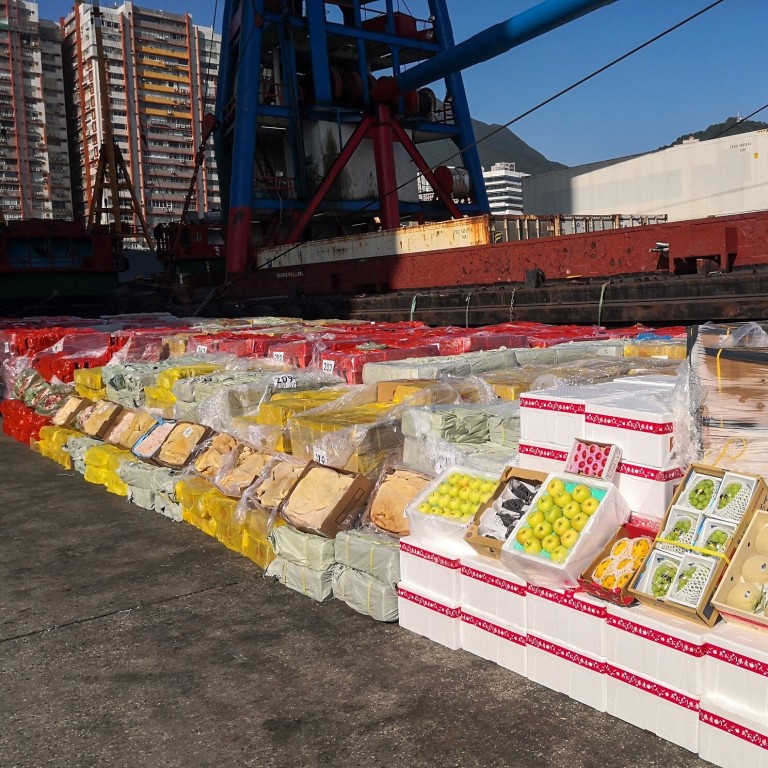
Hong Kong customs arrests 22, seizes HK$20 million in high-end fruit, frozen meat during raid on barge used as ‘mobile warehouse’
- Officials also seized three tugboats tied to the scheme, in which smugglers unload food onto smaller boats bound for mainland China
- About 240 tonnes of meat was seized, including beef, offal and chicken feet from sources including the US, Britain, Brazil, Chile and India
An illegal shipment of high-end fruit and frozen meat worth about HK$20 million (US$2.6 million) bound for mainland China has been seized by Hong Kong’s customs authorities in a case marking the first time smugglers have used barges for this class of produce.
Officials from the Customs and Excise Department revealed on Sunday they had arrested 22 people aged between 20 and 67 in connection with the smuggling in a Thursday night operation. The department said one cargo vessel and three tugboats had also been detained.
“This is the first time we have found high-end fruit being illegally imported through sea smuggling,” said Lui Siu-fai, divisional commander of the syndicate crimes investigation bureau.

“I think the criminals thought it would be easier to smuggle large amounts of fruit in one go.”
The smugglers were caught off Lung Kwu Chau, northwest of Hong Kong. Officers said they had been using the barge as a “mobile warehouse”, transferring the cargo onto smaller vessels to be shipped to China.
The four tonnes of fruit seized included grapes, honeydew, passion fruit, apples and yellow pitaya from Japan and Ecuador, Lui said. Meanwhile, the illegal shipment of frozen meat included up to 240 tonnes of beef, offal, pork, pig offal and chicken feet from the United States, Britain, Brazil, Chile and India.
The officers said it was likely the smugglers were trying to evade import and value-added taxes of up to 90 per cent on the shipment. Skirting the taxes would save about HK$15 million on the frozen meat, and HK$500,000 on the fruit.

Lui also said that tightened restrictions on meat imports in China could also be a factor, as Indian beef had been barred from the mainland since skin disease was detected on cows from the region.
Under existing regulations, only meat from countries meeting food safety standards can be exported to China.
Divisional commander of ports and maritime command Wong Ngar-lun said some of the confiscated meat would be destroyed, as it had not been kept in cold storage, while the frozen goods would be kept by authorities, who would later apply for a court order to confiscate it.
Hong Kong has seen a rise in smuggling this year, with authorities reporting a 138 per cent surge in the value of confiscated contraband, which has been linked to coronavirus travel restrictions. Frozen meat cases particularly have registered a huge increase, with more illegal meat seized this year alone than the past 10 years combined.
In August, authorities confiscated HK$43 million of frozen meat and arrested 13 people, along with about $18 million in cash and valuables belonging to the alleged syndicate members. Meanwhile, in July, rotting pig carcasses, pork knuckles and offal found washed up on a beach in Tuen Mun was linked to smuggling.

